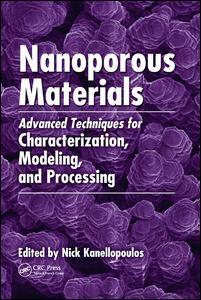Description
Nanoporous Materials
Advanced Techniques for Characterization, Modeling, and Processing
Coordinator: Kanellopoulos Nick
Language: English
Subjects for Nanoporous Materials:
Keywords
Zeolite Membranes; media; Nanoporous Materials; mesoporous; Micropore Volume; correlation; Immersion Calorimetry; length; Supercritical Hydrogen; saturated; Adsorption Isotherms; macroscopic; Hydrogen Adsorption; mechanical; MFI Membrane; properties; Pfg NMR; gas-to-liquid; American Chemical Society; processes; Knudsen Diffusion; Activated Carbon; DSSCs; SEM; Capillary Condensation; GCMC; Gas Hydrates; MOF; Mol H2; Proton Exchange Membrane Fuel Cells; Mesoporous Aluminosilicates; SWNHs; Zeolite Precursors; Acid Sites; Hydrogen Storage
Publication date: 11-2017
· 15.6x23.4 cm · Paperback
Publication date: 02-2011
578 p. · 15.6x23.4 cm · Hardback
Description
/li>Contents
/li>Readership
/li>Biography
/li>
Having successfully replaced elements used in traditional, pollution-prone, energy-consuming separation processes, nanoporous materials play an important role in chemical processing. Although their unique structural or surface physicochemical properties can, to an extent, be tailored to meet specific process-related requirements, the task of characterizing them completely is still a difficult and frequently controversial problem.
Nanoporous Materials: Advanced Techniques for Characterization, Modeling, and Processing outlines existing and expected innovations in the combination of characterization and modeling techniques used to distinguish, monitor, and control the evolution of properties in nanoporous sorbents, catalysts, and membranes during their synthesis and utilization in several important energy processes.
Providing broad coverage of the subject to make it useful for academic and industrial researchers from different disciplines and backgrounds, this book:
- Presents the basic principles and major applications of key characterization techniques?from diffraction and spectroscopy to calorimetry and permeability
- Explores computer simulation techniques, an indispensable complement to the combination of the aforementioned analytical techniques
- Covers the fundamentals and the recent advances in sorption, membrane, and catalyst processes
- Describes two characteristic case studies on emerging areas of application of porous solids in the fields of gas-to-liquid conversion and hydrogen storage
This reference takes a detailed approach to the subject, starting with basics, so that beginners or non-expert readers can learn and apply presented fundamentals and examples to their work. Organized into well-focused sections written by internationally known experts, this book includes case studies, end-of-chapter problems, and illustrative video presentations of basic principles.
Part I: Basic Principles, Recent Advances, and Expected Developments of Advanced Characterization Techniques
Scattering Techniques. Studying Diffusion and Mass Transfer at the Microscale. Nanoscale Microscopies. Calorimetric Techniques. The Combination of In Situ and Ex Situ Techniques for Monitoring and Controlling the Evolution of Nanostructure of Nanoporous Materials.
Part II: Fundamentals, Recent Advances, and Expected Developments of Simulation Methods
Mesoscopic Methods. Characterization of Macroscopically Nonhomogeneous Porous Media through Transient Gas Sorption or Permeation Measurements.
Part III: Fundamentals, Recent Advances and Expected in Sorption, Membrane, Catalytic and Novel Processes Involving Nanoporous Materials
Synthesis Processes of Nanoporous Solids. Sorption Processes. Fundamental Approach to Supercritical Hydrogen Adsorptivity of Nanoporous Carbons. Membrane Processes. Diffusional Transport in Functional Materials: Zeolite, MOF, and Perovskite Gas Separation Membranes, Proton Exchange Membrane Fuel Cells, Dye-Sensitized Solar Cells. Zeolites and Mesoporous Aluminosilicates as Solid Acid Catalysts: Fundamentals and Future Challenges.
Part IV: Case Studies of Applications of Advanced Techniques in Involving Nanoporous Materials
Recent Developments in Gas-to-Liquid Conversion and Opportunities for Advanced Nanoporous Materials. Advanced Materials for Hydrogen Storage.
Nikos Kanellopoulos is with the National Centre for Scientific Research in Greece.




